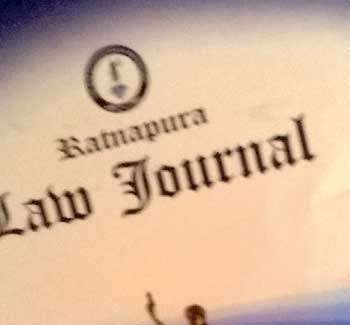Reply To:
Name - Reply Comment
Last Updated : 2024-04-25 17:36:00

 One hundred and fifty years is a long trek in any profession. Ratnapura therefore, has every reason to celebrate its judicial history which commenced in 1868 by the British Raj – indeed a landmark which paved the way to bring out its first ever publication written on the Ratnapura Judiciary to coincide with the historic event.
One hundred and fifty years is a long trek in any profession. Ratnapura therefore, has every reason to celebrate its judicial history which commenced in 1868 by the British Raj – indeed a landmark which paved the way to bring out its first ever publication written on the Ratnapura Judiciary to coincide with the historic event.
The “Ratnapura Law Journal,” the impressive, 411-paged bulky volume, edited by two leading Attorneys-at-Law – B.D. Abeywardena and Palitha Wanasundera of the Ratnapura Bar Association and inspired by its District Judge Miss Prabha Kumari Dela, epitomizes a legal history which has unique characteristics. The inheritance of large extents of land in the gem-rich Ratnapura District from the Sinhala Royalty, has led to complex legal situations which today is posing economic and social problems that no other District experiences.
The Journal does enrich judicial literature with learned essays written by authorities in their respective fields on varied law concepts and legal systems applicable to the District. Anecdotes of some of its eminent lawyers and Judges who have shed lustre to the Ratnapura Bar and lighter moments within and outside the Court make it enjoyable reading.
 How have these specific land issues, confined to the Ratnapura District, evolved? Being part of the Sabaragamuwa Province, Ratnapura came under the Kandyan Kingdom. There had been many Temples and Devalas located in the District to which lands and villages had been gifted by the Kings of Kandy. Ola leaves, plates, stone inscriptions and Grants refer to these donations to the Viharagam, Devalagam and Nindagam. Under this system functioned “Rajakariya” or service towards Temples and Devalas. Service to Nindagam however, was abolished in 1968 when people who served Nindagam owners, legally got their parts of the land. The law however, did not apply to service-tenants of Temples and Devalas.
How have these specific land issues, confined to the Ratnapura District, evolved? Being part of the Sabaragamuwa Province, Ratnapura came under the Kandyan Kingdom. There had been many Temples and Devalas located in the District to which lands and villages had been gifted by the Kings of Kandy. Ola leaves, plates, stone inscriptions and Grants refer to these donations to the Viharagam, Devalagam and Nindagam. Under this system functioned “Rajakariya” or service towards Temples and Devalas. Service to Nindagam however, was abolished in 1968 when people who served Nindagam owners, legally got their parts of the land. The law however, did not apply to service-tenants of Temples and Devalas.
Ratnapura being a District rich with gems, its land fetch extremely high prices. But, as there is no legal recourse for partition with there being co-ownership for the lands of those who perform services to the Temples and Devalas, there is no way for them to claim their rights to their land, like in the case of Nindagam.
Ratnapura being a District rich with gems, its land fetch extremely high prices. But, as there is no legal recourse for partition with there being co-ownership for the lands of those who perform services to the Temples and Devalas, there is no way for them to claim their rights to their land, like in the case of Nindagam. The Journal points out that the lack of legal mechanism to resolve this as yet has not only caused injustice and social inequalities, but is also a tremendous drawback to the economic and social development of the District. Thus, in this modern world that calls for justice, Sabaragamuwa continues to remain judicially tied down with archaic, feudalistic laws.
These Temples and Devalas with large extents of land and scattered liberally in the Sabaragamuwa Province, are governed by ancient law concepts such as the Kandyan Law. Writing on Kandyan Law, Samantha Ratwatte P.C. says that at least 4/5th of the island was ruled by the Lankan Kings at the time the British captured Sri Lanka. The British addressed the Lankan King as the Kandyan Kings. Thus in 1815, all these areas were called the Kandyan Province. But subsequent legislation, made this area smaller.
Although up to now, the laws of the land were uniformly applied to all its inhabitants, the British relegated many of these to personal laws, defining various ethnicities. And they, through the judicial process, entrenched the Roman Dutch Law as the common Law of the country although the Dutch rule was confined only to parts of three out of the present nine Provinces.
How colourful had been the judicial history of Ratnapura? For Attorney-at-Law Palitha Wanasundera, a lawyer in Ratnapura with fifty years experience and hailing from a family of lawyers, there are a few criminal cases that are etched in his memory. For the Kalawana Double Murder case, he harks back to the then Queen’s Counsel such as famous G.G. Ponnambalam, G.E. Chitty and Suppiah Saravanamuttu arriving from Colombo and arguing in defence of the accused with wit and finesse.
He says there were only about twelve Proctors and one Advocate – all males, practising in the District and Magistrate’s Courts in the early 1960s. Fifty years later, numbers have swelled to nearly 150 with almost half of them constituting women.
Another change that took place with the introduction of the Administration of Justice Law in 1973 was the fusion of the two branches – Proctors and Advocates which changed their identification to Attorneys-at-Law although they performed the same legal functions.
There were only about twelve Proctors and one Advocate – all males, practising in the District and Magistrate’s Courts in the early 1960s. Fifty years later, numbers have swelled to nearly 150 with almost half of them constituting women
Lawyer Wanasunderea, who was also the President of the Ratnapura Bar Association says that although it has a large membership and is very active today, it commenced with a small crowd when the few lawyers took turns to hold meetings at their residences. Sarath Muttetuwegama is remembered as one of the most active of its members until his untimely demise. He is however, still hailed as a legend in the Ratnapura Bar.
Making a warning of a drastic erosion taking place in the legal profession, the Journal-editors attributed it to the expansion of entrants to the legal profession, their lack of working knowledge of English and commitment. They insist on the need to continue the great traditions of the Ratnapura Bar some of which the Ratnapura Bar Association says have no parallels.

Add comment
Comments will be edited (grammar, spelling and slang) and authorized at the discretion of Daily Mirror online. The website also has the right not to publish selected comments.
Reply To:
Name - Reply Comment
US authorities are currently reviewing the manifest of every cargo aboard MV
On March 26, a couple arriving from Thailand was arrested with 88 live animal
According to villagers from Naula-Moragolla out of 105 families 80 can afford
Is the situation in Sri Lanka so grim that locals harbour hope that they coul